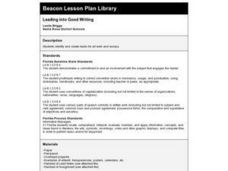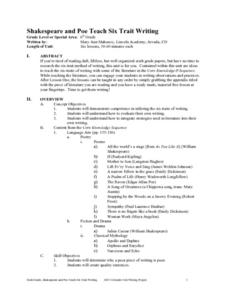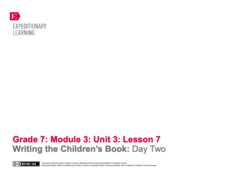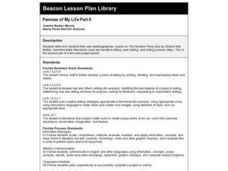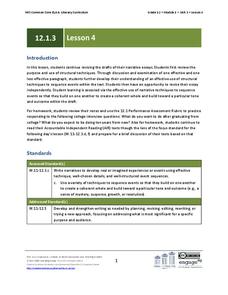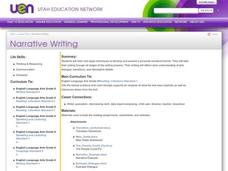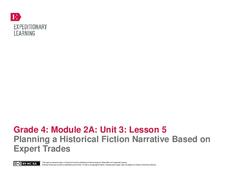Curated OER
Leading into Good Writing
Discuss the importance of a lead in writing with your upper graders. They examine several examples of leads from literature and practice writing leads for pieces of artwork. They then select a topic from a list and write an introductory...
Curated OER
Shakespeare and Poe Teach Six-Trait Writing
A Six-Trait Writing instructional activity helps your middle schoolers liven up their word choice and shows them how to evaluate their own writing. Class members take a close look at the language used in poems by Shakespeare, Kipling,...
EngageNY
Mid-Unit Assessment and Establishing a Context for My Hero’s Journey Narrative
How do writers engage their readers in a story? Pupils consider the question and use the informational text, "The Hero's Journey" to justify their plan for their own fictional narrative. To that end, scholars write an explanatory...
University of Arizona
Fusing Firecrackers with Narrative
Improve your youngsters' descriptive writing. They study an object and write about what they see as a warm-up, then they read an excerpt from Paul Guest's memoir, One More Theory about Happiness. The next part of the...
Curated OER
High School Literary Paragraph Development
You can cover literary elements, writing organization, and proofreading skills in this SMART board instructional activity. Using student paragraphs from a previous assignment, the class reviews the best examples of writing. A SMART board...
Curated OER
Writing Short Stories: The Fun Way
Do your young authors suffer from writer's block when they try to write short stories? Access their natural creativity with C-Gor, the writing monster! The instructional activity takes aspiring authors through a new writing process...
EngageNY
Writing the Children’s Book: Day Two
Following a brief mini-lesson on using dialogue in fiction, young writers continue day two of their writing workshop. They work on the second half of their Children's Book Storyboards, and then they turn and talk with partners to reflect...
EngageNY
Drafting a Historical Fiction Narrative: The Wheelwright
Young writers use the four-square graphic organizer to draft their historical fiction narratives' first, second, third, and fourth paragraphs on the wheelwright. The instructional activity promotes discussion and modeling of what makes a...
Curated OER
Pennies of My Life Part II
Youngsters write and construct their own autobiographies based on The Hundred Penny Box by Sharon Bell Mathis. They engage in pre-writing steps, narrative writing, and peer editing. This is the second part of a two-part project...
Curated OER
Narrative Writing Lesson
Sixth graders experience the stages of process writing, work cooperatively, to critique and to incorporate software tools to enhance writing and problem solving skills.
Curated OER
Collage to Writing
Practice expository and creative writing with your class. Pupils use magazines to find pictures, cut them out, and create a collage. This work of art is then used as a writing prompt. They describe the collage in either a creative or...
Curated OER
Our Dinopals with WordArt
Elementary schoolers use the writing process steps to write a descriptive paragraph about a fictional dinosaur. Using a tech tool lesson, they create a graphic title for the paragraph. A nice blending of technology with "old-fashioned"...
EngageNY
Grade 12 ELA Module 1, Unit 3, Lesson 4
Once again, class groups examine two model paragraphs and, using the provided rubric, evaluate how effectively the writers use structural techniques to sequence events so that they build a specific tone. Individuals then use what they...
Curated OER
Writing-Forming Paragraphs
Fifth graders study how to form paragraphs. In this writing lesson, 5th graders discuss why it is important to have paragraphs in their writing. Students also explore the rules writers use to know where to begin a new paragraph and then...
Curated OER
Narrative Writing
Binoculars are used as a metaphor for good descriptive writing. Class members first view a small picture and then an enlarged view of the same image in which the details come into focus. Next, learners examine a paragraph lacking sensory...
EngageNY
End of Unit Assessment, Part 2: Drafting Introduction and Conclusion of a Narrative
First and last impressions matter. Scholars compose the introductory and concluding sections of their narrative writing assignments. Also, to prepare for an upcoming performance task, pupils watch a modern-day monologue from the movie...
EngageNY
Practice Planning a Historical Narrative: The Wheelwright
Fourth graders use a four-square graphic organizer to plan a paragraph writing about a wheelwright. Using gathered research from the previous unit, young writers discover how to organize a plot in preparation for writing a historical...
EngageNY
Grade 12 ELA Module 1, Unit 3, Lesson 3
Working in pairs, class members use the provided narrative writing rubric to assess the effectiveness of dialogue, pacing, and description in two model paragraphs with similar content. Writers then use the insights they have gained from...
Curated OER
Summer Shorts
Want to use sequence maps in your narrative writing unit? Young writers work to create personal narratives about their summer vacation. They write a narrative of their vacation and create a display using summer clothing shapes made from...
EngageNY
Revising for Organization and Style: Exciting Endings
Young writers compose a gripping ending to their historical fiction narratives. Following the previous lesson plan, where learners wrote a bold beginning, class members examine exciting endings from a literary text. They then draft their...
EngageNY
Planning a Historical Fiction Narrative Based on Expert Trades
Pupils plan for a historical fiction narrative based on their previous research on expert trades from the Colonial Era. Individuals use the four-square graphic organizer to organize the information they want to be detailed in their four...
EngageNY
Revising for Organization and Style: Bold Beginnings
Get young writers thinking about how to write a great beginning for their narratives. After examining examples of solid beginnings in literary text, young writers discuss the criteria for a compelling introduction. Then, independently,...
K20 LEARN
Sweet and Savory Writing: Descriptive Writing
The engagement is in the details. Young scholars learn the benefit of weaving descriptive and sensory details into the fabric of their writing through the activities in this lesson. As their hands explore items concealed in bags, a...
Curated OER
Narrative Writing vs. Explanatory Writing
The class discusses the different purposes an author has for writing. The focus of the discussion is on writing to tell a true story and writing to give information about a specific topic. There are writing purpose sorting cards embedded...
